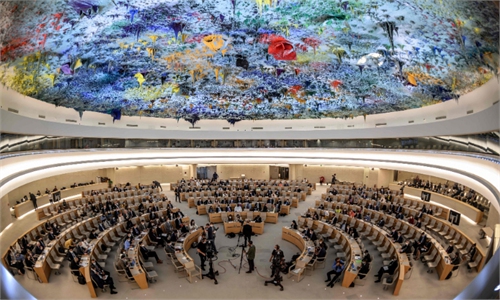
Illustration: Chen Xia/GT
It would be foolish to suggest that events taking place on one day can perfectly define human rights and its ally humanitarianism. Nevertheless, we should remember two important events that took place on March 22, 2024.That Friday began with a US-led effort to get the United Nations approval for a cease-fire to calm the ongoing humanitarian disaster in Gaza. It failed. Critics correctly pointed out that the US' watered down resolution did not go far enough in condemning Israel. For example, Russia's ambassador to the UN said the proposal offered an "effective green light" to Israel to launch a military operation in the south of Gaza.
Previous resolutions failed because the US was unwilling to accept language that called for an unconditional cease-fire. After the American resolution was denied, TIME magazine noted that President Biden has faced increasing pressure and ongoing protests from the left to more forcefully push Israel to stop its bombardments against Hamas that are killing civilians in Gaza. The effort by U.S. diplomats to put forth their own resolution on Friday marked a shift in the Biden administration's U.N. strategy, but not a significant shift in its stance on a ceasefire or the Israel/Gaza conflict more broadly.
The White House would be wise to keep in mind that Americans are dissatisfied with what is taking place in Gaza. A recent Pew Research Center poll reported that roughly one in three US adults had defined "Israel's conduct of the war ...[as] unacceptable." Meanwhile, key members of President Joe Biden's own party, most notably Senate Majority Leader Chuck Schumer, are voicing their displeasure with the events and with Biden's efforts to address them.
On the same day the resolution failed, the largest concert hall in Moscow was the scene of a terrorist attack. As of press time, Russia arrested four suspects in the attack as the death toll climbed to 137. Moscow's mayor called the attack a "huge tragedy."
Whether the White House feels the same way is not clear. Biden himself did not immediately speak to the American people about the attack. However, in October, he did offer his strong support for Israel shortly after the events of October 7, 2023, which led Israel to commence its attacks in Gaza.
There is no reason to believe he will offer any public statement about the carnage in Moscow; the enmity that has developed between him and Russian president Vladimir Putin almost certainly will give Biden a "reason" to stay silent.
This is the same White House that is quick to ask Americans to offer continuous support, even if just a prayer, for the victims of terror, a natural disaster, an accident, anything. But on Friday, there was not enough. Of course, the White House was quick to say there was no evidence to link the attack to Ukraine, a statement that led Russian officials to challenge their American counterparts to share any information it might have on groups that could have carried out the assault. The Wall Street Journal reported that warnings of a possible attack were provided to Moscow by Washington.
The State Department's website proudly notes that the "protection of fundamental human rights was a foundation stone in the establishment of the United States over 200 years ago. Since then, a central goal of US foreign policy has been the promotion of respect for human rights, as embodied in the Universal Declaration of Human Rights."
The Palestinian and Russian people would be justified in questioning that. Both peoples are likely to remember that international organizations find America's commitment to the "protection of fundamental human rights" lacking. One such report found that when it comes to preventing hate crimes, gun violence and excessive use of force by its police agencies, the US comes up short. Another organization suggested that the US does not belong in the top 10 countries when it comes to freedom. Perhaps even more damning is that the US is behind almost all of its closest European allies in this area.
Situational support for human rights and humanitarianism should worry Americans. To borrow a cliche, if their country wants to talk the talk, then it must walk the walk. In other words, the US cannot be a champion of human rights unless it is steadfast in saying and doing what is right all the time. This is the same country that is quick to condemn its rivals for presumed human rights infractions, but rarely asks, if at all, if its own moral compass is pointed in the right direction.
Consider the catastrophe that followed its disastrous and empty claims on weapons of mass destruction in Iraq. Now, consider the image that comes with roadblocking real attempts to bring about a cease-fire in Gaza.
Before its demands for human rights can be taken seriously, the US must do better.
The author is an associate professor at the Department of Communication and Organizational Leadership at Robert Morris University. opinion@globaltimes.com.cn



